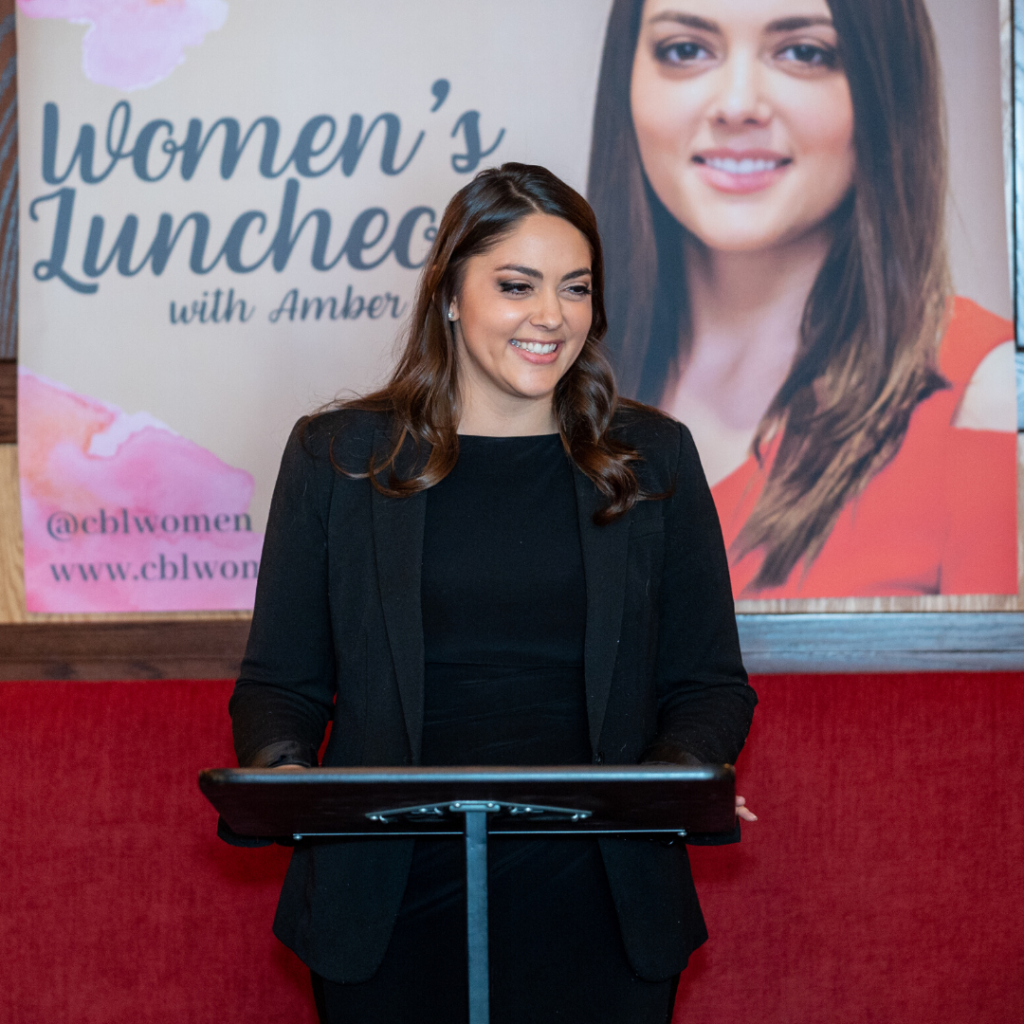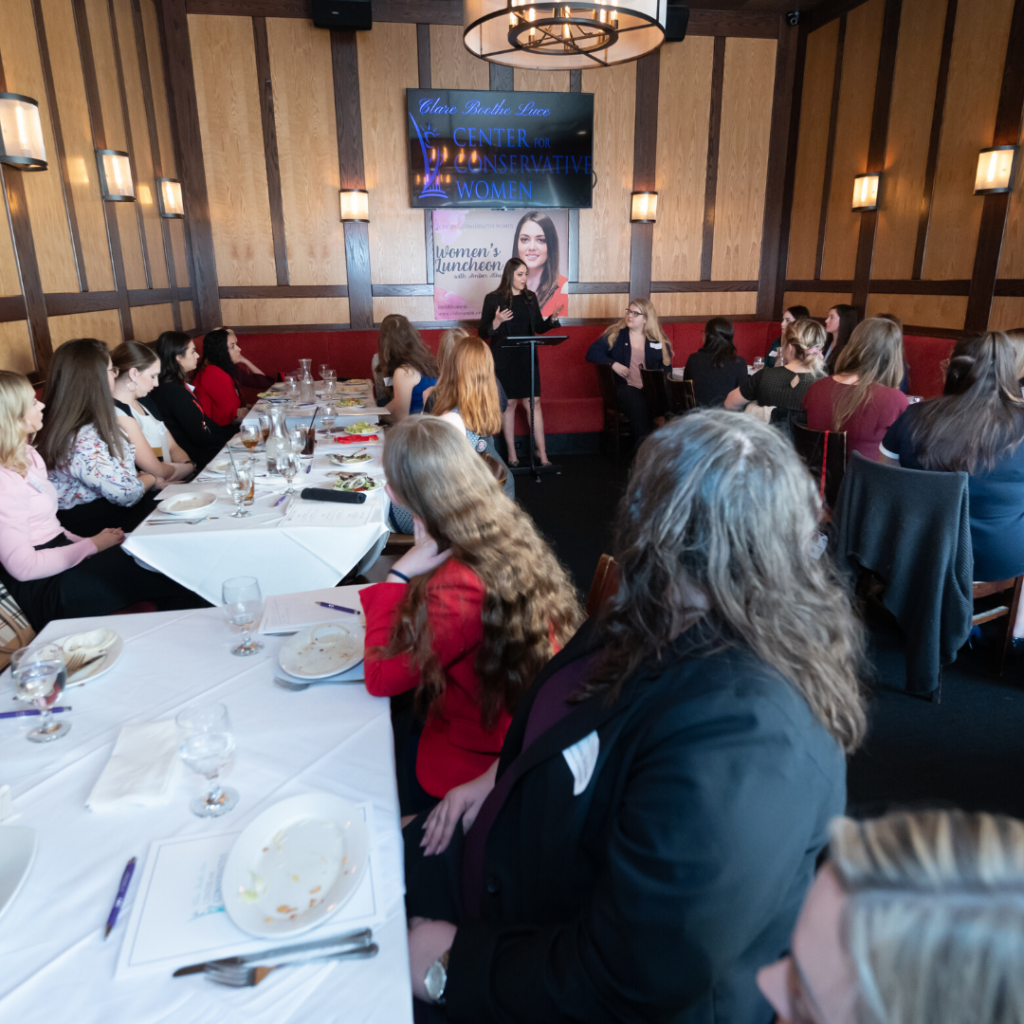March 5, 2020
On February 28, we invited guest speaker, Amber Athey, to join us at our annual CPAC Women’s Luncheon for conservative high school and college women and share her ten tips for professional excellence. At only 25 years of age, Amber has excelled in the field of journalism and has become a public voice for conservatism.
Amber Athey, who has recently announced her new position as the Washington, D.C. correspondent for Spectator USA, was formerly the Daily Caller’s White House Correspondent. Amber is also the host of the podcast, “Unfit to Print,” which dissects each week’s biggest news stories. Prior to the Daily Caller, Amber covered bias and abuse in the university system for Campus Reform. She graduated from Georgetown University in 2016 and since then, has made a huge splash in the conservative world.
With over 35 students in attendance and over 20 colleges and universities represented, Amber’s message and advice will surely be widely spread among peers.
Here are Amber’s 10 tips for professional excellence:
(1) Learn the issues.
The best and fastest way to kick-start your career, whether in journalism or a different field, is to become well-versed on a variety of issues and to clearly understand and be able to defend your opinions. It’s easy, especially in the political world, to stay confined to your bubble in which your friends, peers, and social media feeds agree with you. But if you actively listen to opinions different from your own, and confidently explain why you believe what you believe, you will have a leg up over your peers and those competing for that awesome career opportunity.
“Take the left’s argument and flip it on its head. You can throw statistics at people, but sometimes that just doesn’t work with the left. They work on the basis of emotion.”
(2) Meet everybody you can.
There’s something very enticing about wrapping up in a warm blanket and bingeing the newest Netflix original. However, just know that every time you stay in, you are missing an opportunity to meet new people. And just as Amber said, you never know who you’ll meet that could propel your future ways you’ve never dreamed of. While it’s important to take personal time, it’s also important to put yourself out there because the payoffs are always worth it.
“Try to meet as many people as you can because you never know what those connections may lead to.”
(3) Learn how to speak publicly.
Mastering the art of public speaking is a skill you will use throughout your life. They say more people would rather swim with sharks than stand in front of a crowd and deliver a speech. But if you learn to prepare and confidently stand on stage and speak, your communication skills, leadership skills, and confidence will be a defining feature of your resume.
“Learning how to address different types of audiences while speaking on a stage will put you in a more experienced category than your peers.”
(4) Write, write, write.
Writing regularly sharpens your analytical and rational skills. Working through ideas and writing your opinions on certain issues will challenge you to step back and analyze each of your talking points. Writing regularly also helps you become a better writer. Practice makes perfect, right? If you find yourself missing opportunities to write weekly, or even daily, take time to schedule out your days and make it a priority.
“The best way to get ahead in journalism as a college student is to get published often and develop your writing.”
(5) Develop a backbone.
In any career, but particularly in journalism, your ideas will be flipped upside down and argued from all sides. Not only that, but many will stoop down a level and attack unrelated things, like your appearance. Therefore, it’s important to develop a strong backbone and understand that although there may be many that disagree with you, there are also many that are happy you stand for the very thing they may be too afraid to say.
“Having a backbone will prepare you for attacks you will receive as a conservative woman in the media.”
(6) Always be prepared.
There’s nothing more embarrassing than not being prepared, especially in a professional setting. Remember, if you prepare well, you will be less focused on messing up than you will be on the actual content of your presentation or meeting. Being prepared also enhances your strategic thinking and flexibility, improving your self-discipline and confidence that you can take on anything that comes your way.
“Envision the worst case scenario and prepare for all possibilities.”
(7) Know your audience.
Taking time to prepare materials or a speech for a particular audience helps you figure out what content and messages people care about, and ultimately, their actions afterwards. Will someone appreciate your message so much so that they request an interview with you in the future? Knowing your audience also tells you the appropriate tone and voice for your message and helps you make a great impression.
“Know your audience. Your message will fall flat if you direct it to the wrong person.”
(8) Read other writers.
As a journalist, especially if you’re just starting out, it’s important to develop your own voice and writing style. To help you, read other writers and take notes as to what you like about their writing and how they made an impact on you as a reader. Practice incorporating such writing styles into your own work and before you know it, you will have an identity and unique voice in your field that people want to hear.
“When you’re starting out, try to read the works of as many other journalists as you can and work on your own style.”
(9) Know when to say ‘no.’
Oftentimes, you may find yourself completely swamped with upcoming events, meetings, and important deadlines. We say “yes” because we don’t want to miss out on an exciting opportunity. However, remember that you aren’t superhuman and sometimes you need to say “no.” To make this easier, prioritize your work and personal goals, and if an opportunity comes around that doesn’t necessarily help you get a step closer, consider saying “no” and dedicating your focus elsewhere.
“Remember that your time has worth. Don’t let anyone ever undersell you, and always remember, especially in the field of journalism, that you don’t owe anyone anything.”
(10) Get outside your bubble.
Stepping outside your comfortable bubble and enjoying new experiences, meeting new people, and taking risks can, and often do, pay off in the future. If you are just starting out in your career, make it a priority to try new things and figure out what exactly it is you enjoy doing, and take it from there. Life has many unexpected turns and you may not achieve some of the goals you thought you would in the past. So, do yourself a favor and open new doors for yourself.
“In journalism, and really for any career, it’s important to step out of your comfort zone and meet new people, expand your involvement, and develop stronger positions on particular issues.”


